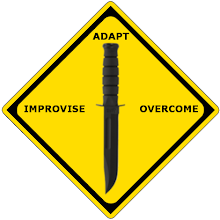CAMP HYGIENE Keeping healthy is an important factor for survival, so strict hygiene should be practiced, not only personally but in the planning and running of a camp. Rubbish and latrines MUST BE kept away from the camp to reduce the threat from flies. Since most of the common diseases in a survival situation are water-born, pollution of drinking water MUST BE RIGOROUSLY AVOIDED. Food scraps and other rubbish should be burned in the fire if possible.
CAMP LAYOUT Select sites for all camp activities so that they do not interfere with each other or pollute the living and cooking areas. If you are camped by a river or stream, fix specific sections for activities and keep to them. Latrines should be dug downhill of the camp and away from the water supply so that there is NOpossible risk of seepage polluting either.
ACTIVITY AREAS Establish a water point from which drinking water will be collected and ensure that nobody wash, cleans pots, scrubs clothes or otherwise uses the water upstream of this point. Downstream, choose a wash point for personal bathing and clothes washing and farther downstream of that select a place to be used for cleaning cooking utensils.
LATRINES AND URINALS Latrines and rubbish disposal should be well away from the camp and preferably downwind. But not so far away that is inconvenient and people are tempted to go elsewhere. If necessary cut a track to it to make access easier.
It is important that proper latrines be established, even for the lone survivor. With a group, separate latrines for the sexes may make a mixed group feel more comfortable, and as much privacy as possible should be provided.
Even if you have it, DO NOT use disinfectant in a latrine. Lime or disinfectant would kill the USEFUL bacteria that break down waste, it will then start smelling! After using, cover the waste with earth. Add small amounts of water that will promote the bacteria. Make a latrine cover to keep out flies and REMEMBER ALWAYSto replace it, or flies may walk all over your food and start a cycle of infection. If, after a time, a latrine starts to smell, dig a new one. Fill in the old latrine. Build a new seat and burn old timbers and covers.
DEEP TRENCH LATRINE Dig a trench about 1.25m (4ft) deep and 45cm (18in) wide. Build up the sides with logs or rocks and earth to make a comfortable sitting height, sealing the gaps between them. Lay logs across to leave only a hole. Empty wood ash on the logs to make a seal. It will also deter flies. Make a lid of smaller wood to cover the opening or use a large flat rock or a large leaf weighted down with stones. ALWAYS REMEMBERto replace it.
URINAL Dig a pit about 60cm (2ft) deep. Site it close enough to the camp to ensure that people bother to use it.
RUBBISH DISPOSAL Rubbish, after checking that it really has no USEFULvalue, should be burned, and what cannot be burned should be buried. If there is too much waste for the camp fire to burn, make a separate fire in the latrine area. If a large can is available use it as an incinerator. Bury any unburned refuse in a garbage pit.
CAMP DISCIPLINE Do not prepare wild game in camp. Bleed, gut and skin downwind and downstream from camp. Keep food covered and off the ground. If kept in trees MAKE SUREit is secure from tree-dwelling animals.
Replace lids on water bottles and containers IMMEDIATELYafter using them. Stow spare clothing and equipment in your shelter. Do not leave it lying where it can get wet, soiled, or burned.
Have a place for everything and keep things tidy. Use a tree for hanging mess tins and cooking utensils. Hook them on twigs and branches, a place for mugs and spoons and keep everything off the ground.
Note:Never leave your campfire unattended.
SOAP Washing with soap removes natural oils, leaving the skin less waterproof and more prone to attack by germs. In survival circumstances it is a mistake to wash with soap too often. However, soap is the most widely used antiseptic, better than many others, such as iodine, which destroy body tissue as well as germs.
Always scrub hands before administering first-aid for wounds.
NEVER SIT ON DAMP GROUND Use something, even if it is only a log. If there is no ready-made seat available, lash together a couple of low A-frame supports and rest another branch or log across them.
CAMP BEDS A sound night's rest is worth a little toil. Time spent in making a camp bed that will keep you both comfy and warm, is time well spent.

 Subscribe
Subscribe